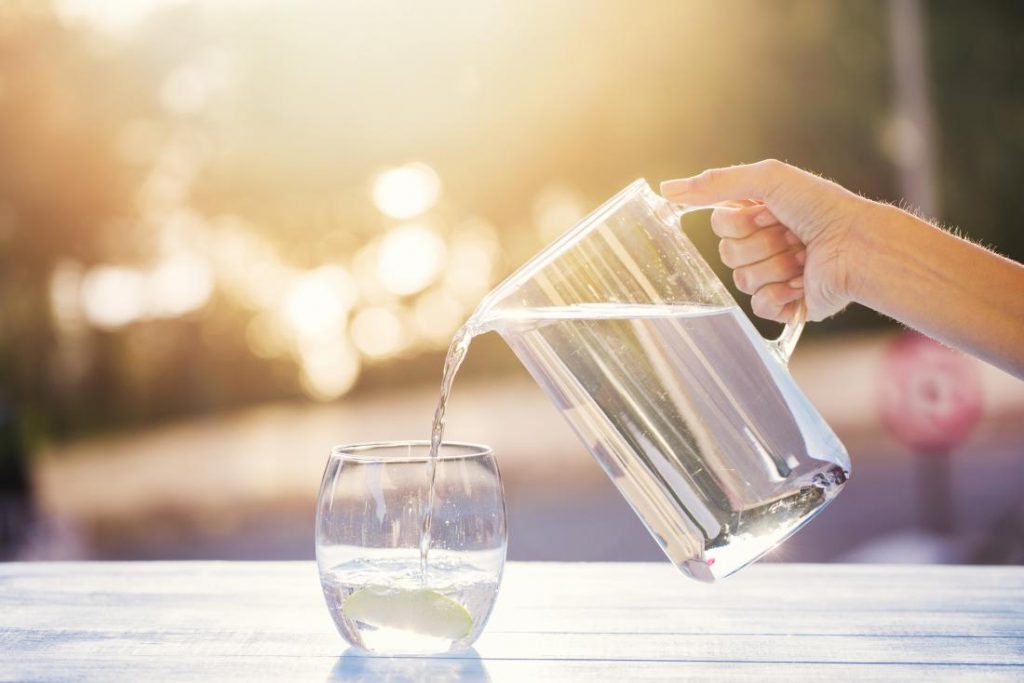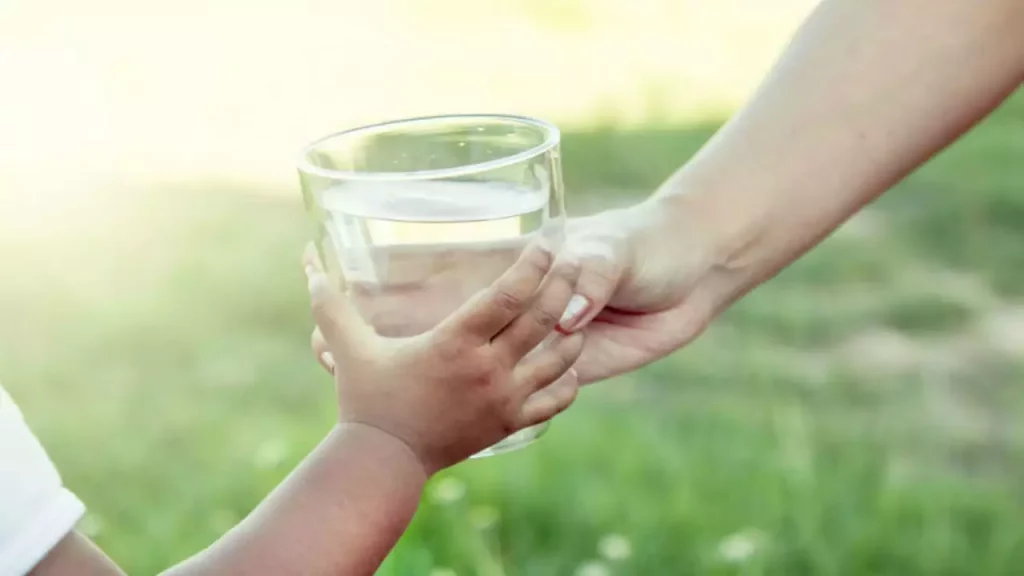Drinking water is a fundamental and essential aspect of maintaining good health. It refers to the consumption of plain water, whether from a glass, a water bottle, or even tap water. The human body is comprised of about 60% water, and it plays a crucial role in various bodily functions. Adequate hydration is necessary to support kidney function and prevent the development of kidney stones. It also aids in regulating body temperature, lubricating joints, and protecting the spinal cord. Drinking enough water is particularly important during physical activities or in hot climates, as it helps replenish the water lost through sweating. It is recommended to consume at least eight glasses of water per day, which is approximately two liters or half a gallon. This can be achieved by including water-rich foods, such as fresh fruit, in the diet. Drinking enough water contributes to optimal bodily functions, improves overall health, and supports physical performance.
Water is Essential for Maintaining Good Health.
Drinking enough water each day is essential for maintaining optimal health and performance in physical activities. Staying adequately hydrated offers a multitude of benefits that encompass not only our physical well-being but also our overall sense of vitality.
One of the most noticeable benefits of drinking enough water is the improvement in skin health. Proper hydration helps to maintain the elasticity and plumpness of the skin, reducing the appearance of wrinkles and promoting a healthy complexion. Additionally, sufficient water intake supports optimal digestion, preventing constipation and promoting regular bowel movements.
For those looking to manage their weight, drinking enough water can be highly beneficial. Water serves as a natural appetite suppressant, helping to reduce calorie intake and prevent overeating. Furthermore, staying hydrated aids in the breakdown and absorption of nutrients, ensuring efficient metabolism.
When we’re properly hydrated, our energy levels are elevated. Dehydration can cause feelings of fatigue and lethargy, while adequate water intake keeps us alert and energized. Proper hydration is crucial for maintaining optimal physical and cognitive performance throughout the day.
It’s important to note that hydration needs may vary for each individual based on factors such as activity level, body weight, and health conditions. A general guideline is to aim for at least 8 glasses, or around 64 ounces, of water per day. However, this may need to be adjusted based on your specific requirements.
Physical Benefits
Drinking enough water not only quenches our thirst but also provides numerous physical benefits. One of the most noticeable advantages of proper hydration is the improvement in skin health. When our bodies are well-hydrated, our skin appears more elastic and plump, reducing the visibility of wrinkles and promoting a healthy complexion. Additionally, sufficient water intake supports optimal digestion, preventing constipation and promoting regular bowel movements. Drinking enough water can also aid in weight management. Water acts as a natural appetite suppressant, helping to reduce calorie intake and prevent overeating. Furthermore, staying hydrated ensures efficient nutrient breakdown and absorption, thus supporting a healthy metabolism. Additionally, maintaining proper hydration levels enhances energy levels and overall physical performance. Dehydration can lead to feelings of fatigue and lethargy, while adequate water intake keeps us alert and energized. Remember to adjust your water consumption based on factors such as activity level, body weight, and health conditions. Aim for at least 8 glasses of water per day, but be sure to listen to your body’s specific needs.

Improved Performance in Physical Activities and Sports
Drinking enough water every day is crucial for optimal physical performance, especially during physical activities and sports. Staying adequately hydrated can significantly improve performance and prevent the negative effects of dehydration on the body.
Dehydration negatively affects physical performance in several ways. Firstly, it reduces endurance, making it difficult to sustain high-intensity activities for a prolonged period. Secondly, it increases fatigue, leading to decreased energy levels and diminished stamina. Additionally, dehydration impairs thermoregulatory capability, making it harder for the body to regulate core temperature, which is vital for optimal performance.
Several studies have highlighted the impact of dehydration on physical performance. One study found that a water deficit of just 2% can impair endurance, strength, and concentration. Another study showed that a 3-4% reduction in body water can lead to significant declines in performance. These findings highlight the importance of maintaining adequate hydration levels for optimal physical performance.
To prevent dehydration and its negative impact, individuals engaged in physical activities or sports should consume fluids regularly. While plain water is often sufficient, sports drinks may be beneficial for those undertaking intense or prolonged activities. It is essential to drink fluids before, during, and after physical activities to ensure adequate hydration.
Improved Body Temperature Regulation
Drinking enough water plays a crucial role in improving body temperature regulation. When the body becomes dehydrated, it loses its ability to regulate core temperature effectively, making it difficult to stay cool in hot environments or during strenuous physical activities.
Proper hydration is especially important in preventing heat-related conditions, such as heat stroke. Heat stroke occurs when the body’s core temperature rises to dangerously high levels, leading to symptoms like dizziness, confusion, and even organ failure. By keeping the body properly hydrated, individuals can prevent heat stroke by ensuring that their core temperature remains within a safe range.
Sweating is the body’s natural way of cooling down. Factors like environmental temperature, humidity, and the intensity of physical activity influence sweat production and the amount of water lost through sweating. When the body is hydrated, it can produce an adequate amount of sweat to help cool down the body and maintain a stable core temperature.
Adequate hydration is vital for thermoregulation, which is the body’s ability to maintain a stable internal temperature. By drinking enough water, individuals support the body’s capacity to dissipate heat through sweat and maintain a balanced core temperature.
Reduced Risk of Kidney Stones
Drinking enough water has numerous benefits for our overall health, including reducing the risk of kidney stones. Kidney stones are solid mineral crystals that form in the urinary system, causing extreme pain and discomfort. Adequate fluid intake plays a crucial role in preventing the formation of these stones.
When we consume an insufficient amount of water, the concentration of minerals in our urine increases, making it more likely for them to crystallize and form clumps. However, by increasing our fluid intake, we effectively dilute the concentration of these minerals in the urinary tract, making it harder for them to form kidney stones.
For individuals prone to kidney stones, it is crucial to maintain a steady and adequate fluid intake. The recommended daily fluid intake is typically around 2 to 3 liters, or about 8 to 12 cups, of water per day. However, it’s important to note that the specific requirements may vary depending on a person’s age, sex, activity level, and health condition.
Improved Kidney Function
One of the significant benefits of drinking enough water a day is improved kidney function. Adequate water intake supports optimal kidney function and reduces the risk of developing kidney stones.
When we consume an insufficient amount of water, the minerals in our urine become more concentrated, making it easier for them to crystallize and form clumps, leading to the formation of kidney stones. By increasing our fluid intake, we effectively dilute the concentration of these minerals in the urinary tract, making it harder for them to form stones.
To promote kidney health, experts recommend a daily fluid intake of about 2 to 3 liters or around 8 to 12 cups of water per day. It is essential to note that individual fluid requirements may vary based on factors such as age, sex, activity level, and overall health condition.
By staying adequately hydrated, we can reduce the risk of kidney stone formation and support our kidneys’ optimal function. Drinking enough water not only helps in flushing out waste and toxins from the body but also plays a crucial role in maintaining overall kidney health. So remember to prioritize your water intake and keep your kidneys happy and healthy.
Cognitive Benefits
Drinking enough water has cognitive benefits. The brain needs water to function properly. Water is essential for neurological processes. This article explores the cognitive advantages of staying hydrated. It’s important to drink enough water throughout the day. Proper hydration is crucial for optimal cognitive function. Mild dehydration can reduce cognitive performance. Attention, memory, and concentration can be affected. Dehydration limits the brain’s resources for cognitive tasks. Staying hydrated supports efficient information processing and cognitive function. Adequate hydration improves mood and mental well-being. Fatigue, irritability, and anxiety can result from dehydration. Proper hydration leads to better mood regulation and alertness. It reduces symptoms of depression and anxiety. Hydration increases productivity and focus. It improves task performance and cognitive abilities.
Improved Concentration and Memory Function
Drinking enough water each day is crucial for maintaining optimal cognitive function, including improved concentration and memory function. Adequate hydration plays a significant role in supporting these cognitive abilities.
Mild dehydration can have a noticeable impact on mood, cognitive functioning, and short-term memory. Research has shown that even a 1-2% decrease in hydration levels can result in decreased cognitive performance. Mildly dehydrated individuals may experience difficulties in focusing, processing information, and retaining new memories.
Proper hydration is particularly important for cognition in children, adults, and older adults. In children, dehydration can negatively affect their attention span and overall cognitive performance. For adults, drinking as little as 300 to 1000 mL of water can improve cognitive performance, even in cases of mild dehydration. Older adults also benefit from staying adequately hydrated, as it helps preserve cognitive abilities and reduce the risk of age-related cognitive decline.
To enhance concentration and memory function, it is essential to prioritize proper hydration. By regularly drinking enough water throughout the day, individuals can support their cognitive abilities and maintain optimal brain function. Remember to stay hydrated and reap the cognitive benefits it offers.
Better Moods and Stress Management
Drinking enough water not only benefits our physical health but also plays a crucial role in improving our moods and stress management. Proper hydration is essential for optimal brain function, as our brain relies on adequate hydration to facilitate signaling routes, remove toxins, and provide energy sources. These factors contribute to improved mood and overall mental well-being.
A study conducted by the Isfahan University of Medical Sciences found a significant correlation between increased water consumption and a decreased risk of depression. Participants who consumed higher amounts of water were found to have lower rates of depression compared to those who had lower water intake. This suggests that staying hydrated may have a protective effect against depressive symptoms.
Dehydration can hurt cognition and mental well-being. Even mild dehydration can lead to decreased cognitive performance, difficulties in focusing, processing information, and retaining new memories. By staying adequately hydrated, we can support optimal brain function and enhance our cognitive abilities, ultimately leading to better moods and improved stress management.
To experience the benefits of better moods and stress management, it is important to ensure adequate water intake throughout the day. Remember to listen to your body’s signals and drink water regularly. By prioritizing hydration, we can nourish our brains and promote mental well-being.
Increased Creativity and Problem-Solving Ability
Drinking enough water a day doesn’t just keep our bodies hydrated, it also has a profound impact on our cognitive function, including our creativity and problem-solving ability. Proper hydration is crucial for maintaining optimal brain function, leading to improved focus, mental clarity, and increased cognitive abilities.
When we are hydrated, our brain cells can function at their best, allowing us to think more clearly and creatively. Studies have shown that even mild dehydration can impair cognitive performance, making it difficult to focus, process information, and come up with innovative solutions to problems. By ensuring we drink enough water throughout the day, we can enhance our creative thinking and problem-solving skills.
One of the key benefits of adequate water intake on cognitive function is improved focus. When we are dehydrated, our attention span decreases, and we may find it challenging to stay on task. By maintaining proper hydration, we can sustain our focus for longer periods, leading to increased productivity and efficiency in problem-solving.
Additionally, drinking enough water helps promote mental clarity. When our brain is dehydrated, we may experience brain fog, making it harder to think clearly and find creative solutions to challenges. By staying properly hydrated, we can enhance mental clarity, allowing us to approach problems with a fresh perspective and come up with innovative solutions.
Hydration Recommendations
Hydration is crucial for maintaining optimal health and well-being. The human body is composed of about 60% water, highlighting the importance of proper hydration. Staying adequately hydrated comes with numerous benefits, not only for physical health but also for cognitive function and overall performance. By understanding hydration recommendations and ensuring we drink enough water each day, we can reap the rewards of improved mental clarity, focus, and productivity. In this article, we will explore the importance of hydration and delve into the specific recommendations for daily water intake.

Daily Intake Requirements
To maintain proper bodily functions and overall health, it is crucial to ensure adequate hydration through daily water intake. The average recommended daily intake of water can vary depending on several factors. For men, the recommended daily intake is about 3.7 liters (15 cups), while for women, it is around 2.7 liters (11 cups). It is important to note that around 80 percent of the fluid intake should come from drinks, including plain water.
However, it is worth noting that water is not the only source of hydration. Fresh fruits, vegetables, and all non-alcoholic fluids such as tea, coffee, and juice also contribute to the daily intake requirements. These beverages contain a significant amount of water and can be included in the overall fluid intake.
Several factors can affect the amount of daily water intake needed. An individual’s activity level, outside temperatures, overall health, medications, and age can influence their hydration needs. For instance, individuals engaging in physical activities or those living in hot climates may require higher water intake to compensate for fluid loss through sweat. Similarly, certain health conditions or medications may increase the need for fluid intake.
Adequate Hydration for Different Activity Levels
Adequate hydration is vital for individuals of all activity levels, as water is essential for optimal bodily functions. However, the specific hydration needs may vary depending on the intensity and duration of physical activities.
For individuals with light activity levels, such as those who have sedentary jobs or engage in minimal physical exercise, the recommended fluid intake is around 2.7 liters (11 cups) for women and 3.7 liters (15 cups) for men. This level of hydration is generally sufficient to maintain proper bodily functions throughout the day.
Those with moderate activity levels, which include regular exercise or physical activities, should aim to consume more fluids to prevent dehydration. It is recommended for women to drink around 3.7-4.7 liters (15-19 cups) of fluids per day, while men should aim for 4.7-5.7 liters (19-23 cups). These higher fluid intake guidelines take into account the increased water loss through sweat during physical activities.
Individuals with high activity levels, such as athletes or those who engage in intense and prolonged physical training, have the highest hydration needs. They should aim for even higher fluid intake to replenish the significant water loss during their workouts. The recommended fluid intake for these individuals ranges from 5.7-8.4 liters (23-34 cups) for women and 6.7-10 liters (27-40 cups) for men.
To ensure adequate hydration, it is important to monitor fluid intake and adjust accordingly based on the different activity levels. Staying properly hydrated can help optimize physical performance and prevent dehydration-related health concerns.
General Guidelines for Drinking Water Every Day
Drinking an adequate amount of water every day is essential for maintaining overall health and well-being. While the specific water intake requirements may vary based on individual factors, there are general guidelines to ensure proper hydration.
For most individuals, it is recommended to consume at least 2-3 liters (8-12 cups) of water per day. However, this can vary depending on various factors such as age, activity level, and health conditions. It’s important to listen to your body’s signals of thirst and adjust your water intake accordingly.
To increase water intake, there are several strategies you can implement. First, carry a favorite water bottle with you wherever you go to encourage frequent sipping. Setting visual reminders, such as alarms or sticky notes, can prompt you to drink water throughout the day.
Another effective technique is to make it a habit to drink a glass of water after each bathroom break, ensuring consistent hydration. Adding slices of fresh fruit or using water enhancers can also make water tastier and more appealing.
Drinking a glass of water before meals can aid digestion and help control portion sizes. Additionally, prioritizing water consumption during hot climates or when engaging in intense physical activities is crucial to prevent dehydration.
Remember, staying hydrated has numerous benefits, including regulating body temperature, supporting organ function, and maintaining healthy skin. By following these general guidelines and implementing simple strategies, you can ensure adequate hydration and optimize your overall health.
Conclusion
In conclusion, ensuring you drink enough water each day is crucial for maintaining overall health and supporting essential bodily functions. Failing to meet your daily water intake requirements can lead to dehydration, which poses various risks to your well-being.

